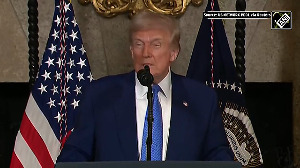 China, a major destination for foreign direct investment, has imposed stern rules on foreign companies to buy or merge with domestic companies, especially those dealing with defence equipment.
China, a major destination for foreign direct investment, has imposed stern rules on foreign companies to buy or merge with domestic companies, especially those dealing with defence equipment.China will establish a ministerial panel to review foreign firms' attempts to buy or merge with domestic companies, laying the ground for the country's first formal process for scrutinising national security questions that arise from international deals, official media reported in Beijing.
"A panel would be established to examine proposed foreign acquisitions of local companies dealing in military or national security work," said the Chinese Cabinet.
It said the committee will review foreign companies' attempts at buying or merging with domestic companies whose business pertains to defence, agriculture, energy, resources, infrastructure, transportation, technology or equipment manufacturing.
The National Development and Reform Commission, China's top economic planning organisation, and the Ministry of Commerce will lead the review panel, according to the new rules.
The arrangement forms a part of China's long-term plan to build a formal process to judge the merits of foreign takeovers.
China brought about an anti-monopoly law in 2008 that requires foreign firms to pass tests meant to prove that they pose no threat to China's national security.
The law also calls for the protection of important Chinese industries.
Such provisions led to the cancelling in 2009 of Coca-Cola's $2.4 billion bid to take over the Chinese fruit juice maker Huiyuan Juice Group.
Before that, multinational firms that wanted to buy or merge with Chinese companies faced little scrutiny and had to meet few requirements.
Despite global down turn, China last year attracted $105.74 billion last year, an increase of over 17 per cent compared to last year.
It is to be seen what impact the new regulations would have on FDI. China recorded 1,798 mergers and acquisitions in 2010.
The transactions had a disclosed value of $82 billion, an increase of 13.8 per cent above the amount in 2009, according to figures from ChinaVenture Group, a Beijing-based investment consulting firm.
And the number of foreign takeovers grew by 57.9 per cent over the previous year.
The bulk of the foreign acquisitions last year were made by Japan, the United States and France and mainly concerned companies in the pharmaceutical and beer-brewing industries, according to it.
"The new arrangement is part of China's progress in establishing a modern economic regulatory system, which is good," said Zhang Yansheng, Director, Institute for International Economics Research, under the National Development and Reform Commission.
He said China's chief difficulty in enforcing the new rules arises from its scant experience in reviewing foreign acquisitions, adding that China will not use the panel as a weapon to block normal foreign investments.
According to the statement, foreign deals will be evaluated according to their prospective effects on China's economic stability, social order and on its ability to research and develop technology used in protecting national security.
The new rules will take effect next month. Chen Gong, Chairman, Anbound Group, a private industry think tank, said China should establish its own mechanism to review foreign acquisitions of domestic companies, since many Chinese companies have often been blocked in their attempts at buying foreign companies.
He said the evaluation should be open and transparent.
Thirty Chinese firms were acquired by overseas buyers in deals with disclosed value of $2.39 billion, according to ChinaVenture Group.
In 2005, the state-owned oil group CNOOC suffered a huge setback, when faced with political opposition; it had to abandon its $18.5 billion bid for the US company Unocal.
The US Committee on Foreign Investment is also poised to veto a $2 million deal made by China's Huawei Technologies to buy the assets of the US technology firm 3Leaf Systems, according to a report from The Wall Street Journal on February 11.
According to figures from Dealogic, an international data provider, Chinese companies recorded a failure rate of 11 per cent in their attempts at buying or merging with foreign firms.
That measure takes into account announced cross-border deals that were withdrawn, rejected or allowed to expire.
The rate for the US was 2 per cent and that for the UK was 1 percent, the newspaper reported.











 © 2025
© 2025